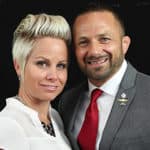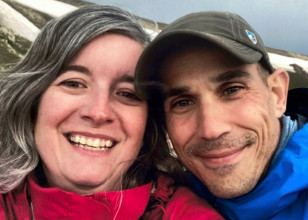
Homemade Meals for Busy Families
Mary Beth Lagerborg, co-creator of Once-A-Month-Cooking, discusses the importance of hospitality and how families can prioritize dinner time by cooking a month’s worth of healthy meals in one session.
Rescue 2x the babies from abortion!
Home » Episodes » Focus on the Family Broadcast » How God Saved a Military Marriage (Part 2 of 2)
Preview:
Kathy Robichaux: For me to ask all these things, to see Chad and love Chad and forgive Chad, it was truly just out of obedience to the Lord.
End of Preview
John Fuller: That’s Kathy Robichaux sharing how God was working in her life and in her shattered marriage. Our host is Focus on the Family President and author Jim Daly. I’m John Fuller, and the book capturing this story is by Chad Robichaux, called Fight for Us. You’ll find renewed hope and encouragement from that book. It’s a story of redemption we’re continuing today.
Jim Daly: John, we heard from Chad and Kathy last time from a conversation we had with them a few years ago, and man, they really went through some heartbreaking and difficult things during their childhood, both coming from broken homes and broken marriages with their parents. Chad later suffered from PTSD after eight tours of duty in Afghanistan in the Special Forces, and it was not a smooth transition back home. Chad continued to deal with PTSD. Kathy, I think in many ways, felt like his protector, his nurturer, as she was trying to raise three kids pretty much on her own, and there was a lot of fear in her at that time. If you didn’t hear last time, you’ve gotta listen to the first part of this painful story, ’cause it really set up what we’re going to talk about today. Kathy and Chad separated for a while after Chad had several affairs. It’s inspiring how God worked through the pain and brokenness, as you’re about to hear.
Jim: You were spiraling down, almost like that death spiral in a marriage, 15 years of struggle.
Kathy: Mm-hmm.
Jim: Kathy, you were feeling all alone. You talked about that last time. We had to drop off at a very touching point when you were struggling with Chad’s affairs and things like that. Let’s pick up the story there. You were trying to figure out what was going on. You’re not even sleeping in the same bed at night. You’ve got this career in mixed martial arts, people giving you accolades, Chad, about what a good fighter you are.
Chad Robichaux: Yeah.
Jim: And how fearless I’m sure you are, and how you were 18 and two, and finding all the… I don’t know, the strokes and the accolades in that environment. Where’s God beginning to show up in this picture?
Kathy: Ugh.
Chad: Well, sadly, that wasn’t even the, the low point.
Jim: That’s not the bottom?
Chad: That wasn’t the bottom, yeah (laughs).
Jim: What was?
Chad: The bottom was, for me was, we separate. We sell our home and move into separate apartments, sign 12-month leases, and started the paperwork for divorce. And me and Kathy had two separate reactions. You know, Kathy went into a church, and I was at this church last week and I remember people telling me that she would lay against this wall and just be crying against this wall, and she started, you know, just really getting people around her to encourage her and pray for me. And I went into this apartment and thought I was going to live the single life which lasted about a week. And then I had that time to reflect and realize that of all the people I’ve blamed my whole life, my father, the military, really Kathy, for not understanding what I’d been through. Like, I always just blamed everyone else around me as an idiot, and the realization that it was me. And that I had caused this, I had destroyed my family. And so that kind of clarity in my life at that time led me to make a decision to remove myself from the situation, and I decided I was going to take my life. And I would sit in my closet. You know, I was a policeman before so I knew what would happen. Somebody would find me, and I didn’t want my kids to find me, and I’d heard the statistic that one in three children from a parent that committed suicide will take their life as well. I still don’t know where I heard that, but I remember thinking it and thinking, “Man my kids, they follow me in everything I do, they’ve been wrestling since they could walk.” And I didn’t want to leave that legacy for my kids. So I was trying to plan how I was going to make it look like an accident, but I remember just sitting in my closet for a period of about two weeks with my pistol and just trying to, talk myself into, into doing this.
And then I got a knock on my door from Kathy, and she had the divorce papers, the final divorce papers, and I just needed to sign. We had been through the three months, cool off period or whatever it was, in Texas at the time. And she wouldn’t give me the paper. We were very kind of edgy. Any conversation between us was very, very hostile. But she asked me this question that just changed, it’s the reason we’re sitting here today. She asked me how I could be as successful as I was in the military, as an MMA fighter, doing all the schools and deployments and the crazy deployments that we did, and when it comes to your family, you’ll quit.
Jim: So how can you fight for everything else, but you don’t fight for our marriage?
Chad: That’s right. And that question, you know just radically impacted me. I don’t like being called a quitter. But she was right.
Jim: So she pushed the right button.
Chad: Yeah.
Jim: Were you hoping to do that, or was that just a God thing?
Kathy: No, that was totally a God thing, ’cause I know I had said that in some ways before, because I didn’t understand it. I mean watching him, if you Google Chad’s name, you see these amazing pictures. MMA pictures of him. Total façade, right? And, and in our home it’s fallen apart. Our kids are hurting. Our kids don’t understand what’s happening. And everybody believed like Chad was just, I don’t know, almost a god I think they were looking at him like. They just, like loved him, you know. And my husband is willing to give up his family for all of, you know people that are just loving on him (laughs) you know…
Jim: And praising him.
Kathy: … everybody’s … What’s hard is I didn’t understand how he can feel everyone else’s attention and their, I don’t know, the praise they would give him I guess, but, but he couldn’t feel anything from me. You know, nothing I said. I know we had really bad times at that time there was no way to love him and show him love or care anymore.
Jim: He wasn’t accepting it.
Kathy: He wasn’t accepting it. And so it hurt, you know, that he would accept this from men and women. And so for us to put our house up for sale and move out and move into different places and … what was crazy is I remember him actually crying when we moved out. I’m like, “You’re the one making these choices to be with other women and you’re crying as we’re packing up our U-Hauls and leaving? Why can’t you just stop doing what you’re doing and let’s say no and I’m doing this?” But he did, and he wanted to continue doing what he was doing. So when I moved into my own place, this is the first time now. I’m in my early 30s and had my children very young.
Jim: How old were the kids at this point?
Kathy: They’re like, elementary, junior high school age, maybe 11, 12, 13 years old thereabout.
Jim: Right.
Kathy: And so this is the first time…
Jim: So they’re aware, they’re fully aware?
Kathy: …oh yeah, they’ve seen some bad…
Chad: They’re devastated.
Kathy: … stuff.
Chad: They’re devastated.
Kathy: They’ve seen that mom’s very jealous of women. They see that. And so when I got into my own place and the kids had to go visit with dad for the first time, that’s the first time I’m having to give up my kids and leave my kids. And I would be home alone, so I just got on my knees, and I just started praying that, you know, asking God “Why?” And I don’t know if I was asking him why so much like why are you doing this to me, but like, why. Why is this happening? I don’t understand. It hurts so bad.
Jim: Did you ever feel like you had an answer to why?
Kathy: Not at that point.
Jim: Yeah.
Kathy: In fact, now I see, with what we’re doing. It’s so clear.
Jim: Wow.
Kathy: But I didn’t see at that time.
Jim: It was only pain.
Kathy: It was just pain. But it was the most intimate time I’ve ever spent with the Lord. Which was the most precious time in my life.
Jim: That’s a powerful statement.
Kathy: It was. It really was. In fact sometimes like thinking I’d love to have that time again when I’m alone with him, but I don’t want to be in that much pain again (laughs).
Jim: Isn’t that interesting how that circumstance or the circumstances that hurt us drive us toward God?
Kathy: Exactly.
Jim: And they are precious times.
Kathy: It was. It was.
Jim: But we Christians tend to want to have comfortable times.
Kathy: (laughs) Yes.
Jim: (laughs) We don’t want to have painful times.
Kathy: Yeah, that’s so true.
Jim: That draw us close to him. Can I ask you Chad, um, as a man, just man to man? When you walked into church on a Sunday and you knew all this stuff was going on, what did that feel like deep in your heart? Not the part you were expressing to everybody at church, but when you’d walk in the front door and guys in particular would come over and say, “Hey, Chad, how you doing, man?” And pat you on the back, and “I saw your fight, and you’re awesome,” all the things that Kathy was saying. What really was going on deep in your heart?
Chad: Well, I felt like a fraud, one. And two I, you know, it made me question if I even believed at all. I mean I had a real struggle with my faith. One, at that time I would have said I had a struggle with my faith, but I believed I was just really angry at God because, you know, things weren’t going my way, and uh, and I couldn’t understand the things that I was struggling with. And so it was kind of a mix of those emotions.
Jim: What in you, because I’m trying, just trying to think of people that I know. What in you kept that Holy Spirit hook in your heart? ‘Cause I think a lot of guys particularly will snap the hook off and walk away. And they go into years of denial, years of frustration. They go through with the divorce.
Chad: Yeah.
Jim: Because they don’t want the hassle. It takes them longer to come to the conclusion that you came to in a relatively short period of time. The U-Hauls go out and you’re thinking, “Wow, what am I doing?” Kathy pops the question, “Why will you fight for your country, but you won’t fight for our marriage?” That penetrates you. What’s that difference between a guy that’s still got that hook from God and even though it may not feel strong it’s there, versus the guy who’s, just cuts that off and walks away?
Chad: Yeah. I think I’ve always felt God, I don’t mean call to ministry, but I just always felt God calling in my life and I always kind of knew it was there.
Jim: To do the right thing?
Chad: To do the right thing. I just didn’t know how to do it. I never had even at a young age, I would say I gave my life to Christ at 14 years old. But there was no mentorship or discipleship beyond that, and so I was left to do it on my own. And so when Kathy asked me this question, I knew I had to make a decision. I knew I had to do something different. You know, we always say, you know, if what you’re doing in your life isn’t working why not do something different? That was that moment for me. But I knew I couldn’t do it by myself, and I had never had anyone around me. I had to go to Kathy. And look at this time in my life I had 1,000 students, I had all these fans. Everyone that told me everything I wanted to hear. And no one in my life that I could trust to hold me accountable to make these changes in my life. And that was a really sad moment for me because I did that. As I inventoried my life, I realized that I had pushed accountability out of my life. I had to go to Kathy and say, “In this church you’re going to, is there someone that could help me with this, hold me accountable to this?”
Jim: Huh.
Chad: And she introduced me to this man, Steve Toth. He never served in the military, and I think God made him ADD and wired him specifically to deal with me (laughs) because he didn’t give me time to manipulate him.
Jim: Really?
Chad: Yeah. I’d literally wrote a plan out on paper how I was going to fix my life, and he looked at this plan. We met for coffee at Starbucks, and he looked at my plan and, I don’t even think he looked at it. He just slid it back to me and said, “You’re going to fail. You’re going to end up right back where you are.” And I was like, “Well it’s a good plan.” And he was like, “No, it has nothing to do with your relationship with Christ, and if you don’t build your life off of that you’re going to end up right back where you’re at right now.”
Jim: Well, speak to that guy that’s in the denial right now.
Chad: Yeah.
Jim: You’re the military guy. Talk to me. If I’m living there, what are you saying to me?
Chad: Yeah, I mean I, you know. I, I believe that for me God was always there. I continued to push him away and cover it up with busyness and accolades and one achievement to the next. And I don’t say that boastfully at all. Matter of fact I was recently interviewed, and somebody read my kind of resume, and they said, “How does it make you feel?” And I said, “It makes me feel terrible. It sounds like you’re describing someone that lived his whole life discontented.” And I was just really searching for, to be the person I would feel I was created to be, and that’s who was longing inside of me. And to be the person God created me to be. And, and instead of just doing that, I covered it up with all these different things. And some of those things I did in my life were good, right? The military service, and I love martial arts, and I love competing, but those weren’t the things that I was created for.
John: This is Focus on the Family with our guests Chad and Kathy Robichaux, and they were here with us yesterday. If you missed that conversation, we do recommend you go back and listen to the first part through the website or the app. Now they’ve written a book called Fight for Us, and we’re about to hear more from them about the redemptive part of their story, so please stay tuned.
Meanwhile, give us a call here at Focus on the Family to request your copy of the book Fight for Us. Our number is 800, the letter A and the word FAMILY. 800 232-6459 or find the details at focusonthefamily.com/broadcast.
And let’s go ahead and continue now with more from Chad and Kathy Robichaux on Focus on the Family.
Jim: Kathy, I need to pick up. We are on the last portion of today’s program. The U-Hauls have gone out. You guys are living in separate apartments. Chad, you’ve contemplated suicide. You mentioned a while ago that you sat for a couple weeks in and out of this closet thinking, “How do I do this without my kids knowing I did this?” Where does God begin now to heal it? She’s mentioned this question about fighting for the marriage. What happened next?
Kathy: Well, for me, in the lowest of my lows, being stuck in my bed and stuck inside my house because I was so depressed, I knew I needed to pray for my husband. But I really didn’t know what to pray for him and I really probably didn’t even want to pray for him…
Jim: Yeah.
Kathy: … because he was making that choice, you know, making the choices to not be married any more. And, but so I picked up the book Power of a Praying Wife. And I thought I would go through like the first, you know, the chapters and see which ones he needs to be prayed for. So I started picking out like, his temptations, his integrity. And, but the very first prayer in there was praying for his wife. And I’m thinking, he should be praying this prayer over me. You know, he needs to be praying for me. And so I began to pray for me, and the Lord really started opening up my eyes to see a lot of my sin in the marriage and what I was not doing to honor God as the wife God had called me to be.
Jim: Okay. Everybody just went, what?
Kathy: (laughs).
Jim: I mean, talk about this because it’s a matter of the heart.
Kathy: Yes.
Jim: The, uh, restate that because it’s so important, and people who are in bitterness and denial, this is the hardest thing to get, that God really wants your attitude…
Kathy: Yes.
Jim: … to move in a better spot.
Kathy: It’s so true. I mean I lived in such bitterness for so long and unforgiveness that I knew it was time to, well I guess I should say I didn’t know it was time. It was really just God opening my eyes to see that it was time to start recognizing my faults in the marriage and how I wasn’t being the godly wife he had called me to be.
Jim: How did that help you attitudinally? I mean when you caught that, when you, “Okay, Lord, it’s me, I gotta get my heart, I can’t control Chad.”
Kathy: Right.
Jim: What did it do for you? In terms of your attitude towards Chad?
Kathy: Right, right. Um, well, I guess because in there I started praying God help me to see Chad the way you see Chad. So I didn’t want to see Chad the way he saw Chad.
Jim: (laughs)
Kathy: Maybe I didn’t know that, but I mean that’s not what Chad was doing, the way God sees Chad (laughs). You know, like, help me to see Chad the way you see Chad and help me to love Chad…
Jim: Yeah.
Kathy: … like you love Chad, and the most, the biggest thing was, help me to forgive Chad the way you forgave Chad. So I’m praying all this stuff, not even expecting to even be back with my husband.
Jim: Yeah, really in faith you’re, you’re praying this.
Kathy: Yes, it was. And it was really just honoring God, is really … And it grew in my heart. It really was true growth for me to ask all these things. To see Chad, love Chad, and forgive Chad. It was truly just out of obedience to the Lord. And I don’t know how it got there, it just did. As I began to pray and get closer to Christ and that intimacy between me and Christ, that’s what came out. That’s what I started living. So how does a woman that has been hurt, and her heart’s been torn out over and over again, say yes to the man that wants to come back home, again, when he’s already, did this to me several times. How does she say yes? All I can say is that God had given me this peace one more time.
Jim: So it softened your heart towards Chad.
Kathy: One more time. It softened my heart, and it really did, it allowed me to see him just with enough grace that I can say yes one more time.
Jim: Wow.
Kathy: But the following year to come, I don’t know if it was harder, just a different hard. It was just so hard the following year to come to obey the Lord to love Chad and to forgive Chad the way he did and to work on that. Not be the woman I was before who threw the past in his face, so therefore we didn’t get anywhere. But now to put my hope and trust, even my anger I felt towards Chad, put this in God’s hand. Put this at the cross every single morning. Now was I successful? Not every day. But I was going somewhere for the first time.
Jim: Yeah. And your heart was improving.
Kathy: Yes.
Jim: I think it’s important for people, particularly women, to catch that though.
Kathy: Yes.
Jim: That you left it to the Lord.
Kathy: Yes.
Jim: That is significant. Don’t undervalue, that’s the thing.
Kathy: Mm-hmm.
Jim: And that is the thing in every marriage, when you can put Christ first. That’s what it means.
Kathy: Yes.
Jim: To put Christ first. Chad, where are you at in this? You’re like, you’re the bad guy (laughs).
Chad: Well I, it was really crazy because I made a decision to make these changes. I had this mentor in my life who’s willing to disciple me.
Jim: And hold you accountable.
Chad: And hold me accountable. And he led me into surrendering my life to Christ in the most authentic level I ever can imagine doing that. And then beyond that he started mentoring me. Actually a year long process of Biblical manhood. And what I discovered at the end of that was, well not just the end of it but through the process is that my marriage is finding restoration, my relationship with my kids would find a restoration. With this PTSD thing that I never, I thought would never go away, matter of fact the doctors had told me it’d be something I’d deal with the rest of my life, that started going away. And what I discovered was, it wasn’t an incident or a series of incidents that really led me to where I was, it was the choices I was making every day, and I’d never lost control of that. And that, God actually had a blueprint for manhood, which I’d sought all along. When I started aligning my life to that, that’s when I found healing. You see, like, I think it’s important to know like, all the pills, all the counselors, all the programs, everything I’d tried before didn’t work. MMA, jujitsu, as cool as those things are, well those things didn’t work.
When I simply made a decision, a decision to align my life with the life I was created to live, through this blueprint, that’s when I found healing. And you know, nothing replaced just stepping into that relationship that, with Christ that God had always had for me all along. And in this process like when I came home and we started restoring our marriage, Kathy went from this woman that was praying for me every day and wanting this man of God, and I’m, now I’m trying to be that, and it was met with a, I mean she was really fearful. And I could see it right away. She would have moments of where she was thankful, but then she’d have moments to where she would almost rebel against it.
Jim: Right.
Chad: And I think it’s really important for couples that are in restoration to understand that. Because I didn’t understand it at first. I’m like, “She prayed for this and now she has it and she wants to take this right back to where she came from,” and I’m so thankful for Steve and the mentorship he gave me because he asked me some tough questions. “Does she have a right to be hurt? Is she scared you’re going to let her down again?”
Jim: Right.
Chad: Uh…
Jim: Well it’s really rebuilding the trust.
Chad: …yeah, yeah.
Jim: And, how long would you say that process has taken, or is it still you know, building? Where are you at, especially for couples who, you know, need that word?
Chad: I would say it was a full year. Now, I had to make a decision. When Steve told me this I, I decided that she was entitled to that. So instead of her getting angry about something or throwing something in my face and me saying, “Hey, you already forgave me for that,” I’d say, “I’m sorry that I did that to you. I can’t believe I did that to you.” And I would try to love her. And sometimes she would let me hold her and love her and pray with her, and sometimes she’d push me away. And I’d walk out of the room and go outside the room and pray for my wife.
Kathy: And that’s what made the difference. That was what was different from the times he had hurt me before.
Jim: You saw more of God in him.
Kathy: I did. I saw him willing to allow me to show my fear without any repercussions. I needed to be able to show him that and him accept that I needed that without shutting me out. Without showing me he was going to leave me. I wanted to see him that he was going to stick by me while I expressed this fear, instead of running out the door. I mean, there were times that I would hear his keys in the drawer open and right away it would put me back in the moment of him leaving me. And for a while he knew he, had to be careful with the keys.
Jim: Did you talk openly about that?
Kathy: Oh…
Jim: Here’s the feeling I have…
Kathy: …yes.
Jim: … when I hear the keys?
Kathy: Yes, exactly.
Jim: Well, that’s good. I mean.
Kathy: He actually, yeah. I hear him say it every now and then that Kathy even had her times of you know things that would actually bring her back to the moment.
Jim: So about a year, how long ago was that? So that was about a year of your marriage, and how many years ago has this been now?
Chad: So that was in 2010 that we were reconciled.
Kathy: Mm-hmm.
Jim: So five, six years?
Chad: Yeah.
Kathy: And then, yeah.
Chad: We went, we started…
Kathy: In 2011.
Chad: … (laughs) right away, people thought it was insane that we would start a ministry right away. But we, when this happened in my life, I felt like I truly did find the cure … I always say the best way to describe it is like I had stage four terminal cancer and was dying, and Steve gave me the cure. Like, and I knew how many other veterans were struggling with suicide, 22 a day…
Jim: Yeah.
Chad: The divorce rates. And I felt like, I found the cure and I want to share it with someone else, and so we started passing it forward to others right away.
Jim: And that’s been your passion is to reach other couples, military couples particularly who are suffering in a similar way.
Chad: Right. Suicides, divorces. Divorce rates are so staggering and…
Jim: Yeah.
Chad: … and we felt like we found, again we found a cure, and a cure is the … you know, everyone talks about the problem in most things like this.
Jim: Yeah.
Chad: And the truth is there is a problem, but there’s also a solution.
Jim: Wow.
Chad: We feel like we have it, and we’ve committed our lives to paying that forward. And we did it pretty quickly and we admittedly said we weren’t out of the woods when we started this. But we were just on a path, and then we wanted to take others along that path with us.
Jim: Well, that’s good. Let’s link at our website, we’ll link to the Mighty Oaks Foundation and people that are motivated, I’d encourage them to help you do what you’re doing with the military as well.
Can I end with this? Because in my heart I was that little boy. I came from that broken home, just like you two both came from broken homes. How are your kids doing now? Are they, in terms of their faith, are they going, “Wow, God is real. Look what happened to our mom and dad.” Where are they at?
Kathy: Mm-hmm. Yeah.
Chad: I remember probably one of the most shameful memories of all this was sitting our kids down and saying it was going to be better, right? You’re not going to have to hear us fight anymore. And, and they were just devastated. And that could have been life long, like destruction for them. But I’m so thankful for the restoration God has brought into our family…
Jim: So you stood up to your word, you mean?
Chad: No, I mean telling our kids that this was going to be better, this divorce. Telling our kids the divorce…
Jim: Oh, the divorce would be better.
Chad: The divorce is going to be better, and you’re not going to have to hear the fighting anymore and that, these things, and the truth was it wasn’t going to be better.
Jim: It was breaking their heart to hear that.
Chad: It was breaking their heart to hear that, yeah.
Jim: Boy.
Chad: We did it anyway, and so they responded so quickly to just grab hold of this. This change and a shift in our hearts, and I’m so proud to say all three of our kids are just on fire for God. Two of them are in Bible college well one’s second semester of Bible college and he’s a Marine Corps reservist, and my daughter’s leaving into Bible college here soon. Our youngest son, he’s just on fire for the Lord too, so, it’s…
Jim: Isn’t that something?
Chad: …it’s amazing.
Jim: It wouldn’t surprise me that they were praying into their pillow at night.
Kathy: Oh, yeah.
Jim: … bring mommy and daddy back together.
Kathy: My youngest one would be the one that hung, while I was struggling, and he would hold my hands and pray with me. It was amazing.
Jim: That’s so sweet. That is so sweet, and all I can say is, well done. The nuggets I’m taking away, and I hope the listeners are as well. You hit it really strong, Kathy. Turn toward God, put your burden on him, trust in him. And you hit it Chad, then find the truth of who you are.
Chad: Yeah.
Jim: And it may not be pretty, but God loves you. He cares for you. And he will pull you in a better path, a righteous path. And that’s what I pull out of this. It’s not our circumstances that dictate who we are.
Kathy: Mm-hmm.
Jim: It’s what we do to deal with them. And in your case, you did so many of the right things, even though you’re doing wrong things as well. But you turned toward God. You put the yoke on him and invited him in, and you began to act more like him.
Kathy: Mm-hmm.
Jim: Praying for each other, loving each other. And that was it. Thanks for being with us.
Kathy: Thank you.
Chad: Yeah, thank you so much.
John: Isn’t it great to see God working in people’s lives like he did for Chad and Kathy? That’s why Focus on the Family is here, to encourage and inspire you in your marriage and in your family relationships, in your walk with Christ. If you’re resonating with some of Chad and Kathy’s stories, don’t wait. Call today and talk to one of our counselors, who can offer the help you need to find redemption for your marriage.
Jim: And John, I really feel like I need to mention a program here at Focus called Hope Restored, which offers intensive marriage counseling. We have several locations across the country, and it has an 81% success rate. We go back to those couples two years later and do a survey, everyone, and find out how they’re doing, and 81% of them are doing better and still married. If your marriage feels like it’s near the end of the rope, ask us about Hope Restored today.
Also, Chad’s new book is called Fight for Us, and your marriage will definitely be strengthened when you read it.
Also, donate today and be part of the team, and I’ll send you a copy of the book as our way of saying thank you.
John: Contribute as you can, and request that book, or ask to speak with one of our counselors. All of that and more when you call 800, the letter A and the word FAMILY. 800 232-6459 or stop by focusonthefamily.com/broadcast.
On behalf of Jim Daly and the entire team, thanks for listening today to Focus on the Family. I’m John Fuller, inviting you back, as we once again help you and your family thrive in Christ.

Chad Robichaux is a USMC Force Recon veteran who served our country on eight deployments to Afghanistan in the War on Terror. He is also a former mixed martial arts world champion, a best-selling author and the president and founder of the Mighty Oaks Foundation. Chad is a widely sought after public speaker and a subject matter expert on PTSD (Post Traumatic Stress Disorder), who has been featured in such media outlets as Fox News, Forbes and The 700 Club. His wife, Kathy, is the co-founder of the Mighty Oaks Foundation and serves as Director of Women’s Programs, leading the organization’s ministry to female veterans and service members. She has a strong connection with women struggling with the heartache of separation and divorce, and speaks publicly as a wife and a mother who fought the war at home for her husband.

Receive the book Fight for Us for your donation of any amount!

For couples in crisis, you can still put the pieces of your marriage back together with Hope Restored.

Visit our online store and purchase a CD of today's program for yourself or to share with a friend.

Couples with military training often show composure in tough times. But that strength can mask the needs of real people who long to be open with each other. Marriages suffer if these needs aren't met.

For victims of PTSD and their spouses, there is hope. Treatment and time can help heal the inner injuries of a person battling PTSD and mitigate PTSD's devastating impact on marriage relationships.

Military families need your support. Here are some insights into what you can do to be there for them.

Do you have resources for a military spouse who's struggling desperately with feelings of loneliness? I honestly believe that loneliness is the source of most other issues military families experience: alcoholism, addiction, divorce, even suicide.

Homecoming is fraught with emotion and expectation. Ensure a smoother transition for growing together after being apart that includes the simple joys of family and clear, steady communication.

How am I supposed to handle the sudden role changes that accompany my military spouse's comings and goings? He is a wonderful husband and father, but we're often apart for long periods of time.

A Naval Corpsman's injury in Afghanistan changed his career and his marriage. But God used the trauma for good.

Unconditional commitment is the key to resisting marital stressors. This is accomplished by attending to each other's needs, honest communication and timely encouragement.

Mary Beth Lagerborg, co-creator of Once-A-Month-Cooking, discusses the importance of hospitality and how families can prioritize dinner time by cooking a month’s worth of healthy meals in one session.

Scott Klusendorf, President of The Life Training Institute and Robyn Chambers, Vice President of Advocacy for Children at Focus on the Family, share strategies and encouragement in the pro-life movement. They offer compassion for abortion-minded women and speak up for pre-born babies. (Part 2 of 2)

Scott Klusendorf, President of The Life Training Institute and Robyn Chambers, Vice President of Advocacy for Children at Focus on the Family, share strategies and encouragement in the pro-life movement. They offer compassion for abortion-minded women and speak up for pre-born babies. (Part 1 of 2)

Larnelle Harris shares stories about how God redeemed the dysfunctional past of his parents, the many African-American teachers who sacrificed their time and energy to give young men like himself a better future, and how his faithfulness to godly principles gave him greater opportunities and career success than anything else.

Amy Carroll shares how her perfectionism led to her being discontent in her marriage for over a decade, how she learned to find value in who Christ is, not in what she does, and practical ways everyone can accept the messiness of marriage and of life.

Jonathan McKee offers parents practical advice and encouragement in a discussion based on his book If I Had a Parenting Do Over: 7 Vital Changes I’d Make.